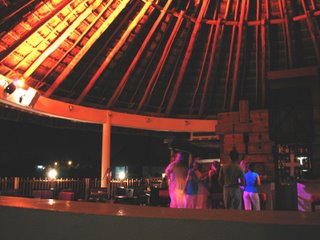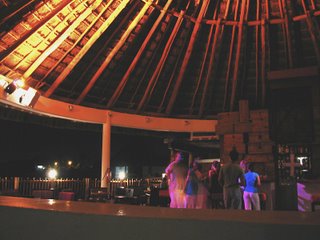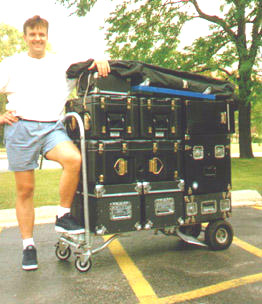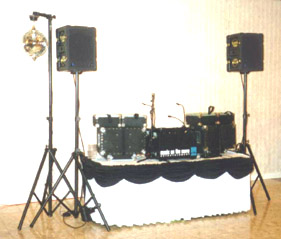Editor’s Note: This story was originally published in the October 2007 issue of Lighting & Sound America.
Club Med Cancun Goes High Tech
Brian Galante
The 2005 hurricane season will go down as one of the bleakest in history, as the list of named storms became so long that forecasters turned to the Greek alphabet. Hurricane Wilma, the last storm from the traditional alphabet, tore through the Gulf of Mexico early that fall, settling on top of the Yucatan Peninsula and barely moving for 48 hours. After making its exit, some of Mexico’s most famous resort areas, including the city of Cancun, were left battered and faced with a long period of rebuilding.
Club Med Cancun, with its shoreline location, was just one of many resorts that sustained heavy damage from winds, rain and an unrelenting storm surge. The club took the opportunity to rebuild its lighting and sound infrastructure along with much of its resort, favoring high-fidelity audio products and a lighting system that was easy to operate yet technically advanced enough to produce the right atmosphere in each room.
The family resort offers a variety of clubs and restaurants to satiate both kids and adults. The open-air design through much of the resort presented many challenges for the audio integration team, which had to balance the desire for high-end audio throughout the club with the reality of Cancun’s harsh weather environment.
We have done plenty of installations in tough environments, but we have never run into environment as harsh as Cancun, said Bill Weir, Owner of Core Audio. Our challenge in these outdoor areas was to install loudspeakers that could sit in the bright sun and survive the ultraviolet degradation, not to mention the humidity and mineral content in the air the latter of which contributes to rapid corrosion. This all adds up to a highly challenging installation, unlike in any region I’ve experienced.
The Core Audio team, in cooperation with Whump Sound, a Los Angeles based dealer specializing in audio installations, led the systems integration. The central equipment room houses a Digigram digital distribution system that routes audio to eight zones, a combination of indoor and outdoor venues, each with a distinct personality. Technomad loudspeakers were selected for all open-air venues, partially due to the true weatherproof design of the loudspeakers. These venues include a mix of restaurants, bars and entertainment areas plus the valet greeting area in front of the resort.
The indoor areas used two other speaker brands: Altec Lansing for in-ceiling installations where architecturally required, such as in the gymnasium and the late night restaurant Las Cazuelas; and Core Audio’s self-designed loudspeakers for The Soluna, the main indoor dance club. The installations play to the strengths of each speaker, but all share one thing in common according to Weir: outstanding audio quality.
The broad dispersion pattern on both the Technomad and Core Audio loudspeakers require fewer loudspeakers per room. The wider audio dispersion eliminates the phasing issues that are common in large installations, where too many loudspeakers cause an uneven sound in certain areas, or a wishing sound as the patron walks through the sound field.
Many resorts of this size put budget over any other consideration when choosing equipment, and the audio reproduction at the end point is anything but musical, said Weir. Club Med Cancun uses a 24-bit distribution system that plays back high resolution audio files, and that fidelity is well represented in each zone due to the choice of loudspeakers. Core Audio uses a patented subwoofer technology that produces very high audio quality, and we were interested in working with Technomad because we wanted musicality in the outdoor zones. The range of products that can withstand the Cancun environment is very limited, and Technomad meets both the musical and environmental requirements.
The outdoor club environment in tropical locations poses difficult weather related challenges for audio integrators, notably ultraviolet susceptibility to loudspeakers, said David Meyer, Commercial Sales Manager for Technomad. While the weatherproofing aspect is important, it has to sound good regardless of the environment. You can deliver the most rugged, bulletproof speaker, but you don’t have anything if the speaker produces poor audio quality.
Audio distribution is handled over Ethernet, with numerous fiber optic hops across the resort property to extend distribution past the 328-foot limit of the Ether Sound protocol. The eight zones (expandable to 16) are interchangeable, meaning that a music stream can be changed to a different destination point through a simple switching system. Since Club Med Cancun is a family resort, the Digigram network also offers a paging system. Digigram ES220 two-channel transceivers are installed at each end point and can receive two channels of Ether Sound audio from an Ethernet stream. The pages can override the audio stream on the two-channel, mono audio design utilized in most zones.
Music streams can be localized to specific zones, or routed to all eight zones simultaneously. The resort leases a proprietary music servicing software that plays out from a central server in the control room and communicates with the Digigram system for distribution. On-site audio engineers can use Soundforge and Wavelap programs to produce personal CDs in the control room, and can interrupt the automated stream to any zone if they want to play the DJ role.
I’d say the most unique aspect of this project is the routing system, said Diaz. The Digigram system is powerful enough to interact with multiple speaker brands, and gives the on-site operator plenty of flexibility in playback. Even though we operated under a very tight deadline, the entire system came together in a very seamless manner.
The central indoor club is The Soluna, which offers an adult-oriented club environment typical of downtown Cancun. The music in this room is played back through Core Audio loudspeakers, with lighting courtesy of iDesign Productions out of Miami. The Core Audio loudspeakers deliver sound pressure levels of an active nightclub at a higher quality level than is typical due to several design features. A custom subwoofer with a quarter-wave resonant system extends the bass, and special two-way, non metallic coaxial compression drivers smooth the mid and high ranges. The loudspeakers are installed in a traditional four-corner configuration, the ideal setup for the enclosed, air-conditioned room.
The Soluna’s lighting system as set up by iDesign employs a scheduler for two different settings: House and Lounge. The programming is more intricate on the House setting, with more aggressive LEDs and stimulating, rapid lighting changes. The Lounge setting is gentler, with soothing, subtle changes. The programs change slightly by the hour on automated settings, and are barely noticeable to guests. The entire system uses an astronomical clock to calculate the exact time of sunrise and sunset each day.
The lights in the Soluna are very subtle for the first hour and add color and depth as the evening progresses, said Michael Meacham, Owner of iDesign Productions. A typical progression may add teals, magentas and ambers as the programs change. The automated settings also take the staffing situation into account. Since many of the employees work on a six-month term, it’s important they understand how to use the system. So we designed to be as foolproof as possible.
Meacham served as the lead designer and installer, bringing a team to the resort and focusing on key areas one at a time as the rebuilding process moved forward. His team integrated a Color Kinetics control and software system with LEDs as the foundation for the Soluna, with installations inside the bar and within soffits in the ceiling. Color Kinetics LEDs were also installed in an outdoor entertainment area that serves multiple purposes .Martin Mac 250 Kryptons and Washes were added throughout the Soluna for articulation.
The outdoor entertainment area, known as The Chispa, offers a movie theater and a performance area with an exceptional A/V and lighting system. The central kiosk area is peppered with palm trees that are lit using Color Kinetics color blasts. The LED fixtures for each palm tree are automated using a Martin Light Jockey control system, with 220 volt power lines providing juice to each palm tree. Like the Soluna, the lighting for this zone is customized to match the event, and can be manually operated on theme nights using a small 8-button switcher. Martin 250 Kryptons and Washes were also installed in the theater area.
We programmed white, stoic lighting for the palm trees on certain nights, but there are other theme nights that benefit from more intensive lighting, said Meacham. This outdoor area features an island where the resort hosts a circus that includes a giant trapeze. We took more creative liberties here: The colors move quicker, and the intention is to recreate the feeling of approaching a carnival. Whether you are inside having dinner, hanging out at the Chispa kiosk or having a drink at the pool bar, these lights are designed to invoke emotion as you look toward the island and see this giant, gorgeous structure lighting up the atmosphere.
The Chispa movie theater is perhaps the most unique aspect of the resort, and according to Weir, a one-of-its-kind system. The integration team painted one side of a three-story hotel building on the resort with retro-reflective, high-gain paint. Guests can sit on the beach or on bench seating in the pool area to watch movies projected onto the building.
A triple DLP 5000 HD projector, mounted in a protective cage on the beach, projects a 30-foot wide, 15-foot tall 16:9 aspect ratio image. Guests can take advantage of a Sennheiser RF headphone system with a broadcast range of 300 feet to watch the movie undisturbed, while those who want to enjoy the ambience can do so without the audio dominating the atmosphere.
DJs and performance groups can also take advantage of this outdoor entertainment area. A pair of Technomad Berlin loudspeakers was purchased for mobile events, and plug in to rack systems on the performance stage. The dedicated control room features an Allen & Heath GL2800 front of house mixer and processing equipment to assist with these live events.
The remaining room-to-room breakdown of Technomad loudspeakers include: The Pergola, a beach bar that features four Noho loudspeakers hung 9 feet above the crowd and two Chicago 15 subwoofers at two corners along the baseboards; eight Vernals in The Chispa and Las Velas, the pool bar; and Noho and Vernal loudspeakers in the valet area, which play back low volume music as guests enter the resort. Crown DSI series amplifiers are used to power the audio in each of these zones, offering full parametric EQ, crossover functions and basic signal processing. (A Rane RPM88 DSP is used to power the Core Audio loudspeakers in the Soluna.)
The Berlins were specifically chosen for mobile events because they are high quality, full range portable loudspeakers that can be used anywhere on the resort at a moment’s notice, said Weir. They offer a full range of sound with excellent bass response and a very nice tonal quality that is ideal for DJ sets. In the Pergola, the Nohos produce enough sound pressure levels at 1 a.m. so that people who want it loud can turn up the volume, but still produce a full, pleasing sound at lower volumes. This was the same idea we had for the Vernal 15 installation in the pollapa, with a higher emphasis on producing clearly audible sound at low levels for conversational situations.
All power and electricity issues were resolved in the early stages, although there were plenty of challenges. Meacham had an easier go of it with the lighting system.LED technology requires very little power, which makes our job that much easier. It is entirely possible that one of the four Mac 250 lights in the main bar took more power than the entire LED display in that zone, he said.
The audio installation proved far more complex, from the cleanliness of the power coming into the resort to more common grounding issues. We had to resolve numerable electrical engineering issues ahead of time, from improper load balancing in the main three-phase transformer to adding clean technical earth at multiple entrance points, said Weir. We removed a lot of the audio on common phases with large inductive loads, like refrigerator compressors. We also custom built resident filters with some of the power lines to filter out harmonics generated from motor noise in the AC system. It was pretty much a nightmare situation that required a lot of troubleshooting.
The electricity issues proved to be the only real undesirable aspect of the project, and the end result has been pleasing to everyone involved.
Contractors may view this as a standard design in terms of audio and lighting, and it is similar to what you see today in theme parks and large corporate installations, said Diaz. But the resort community seems ready to catch up.




